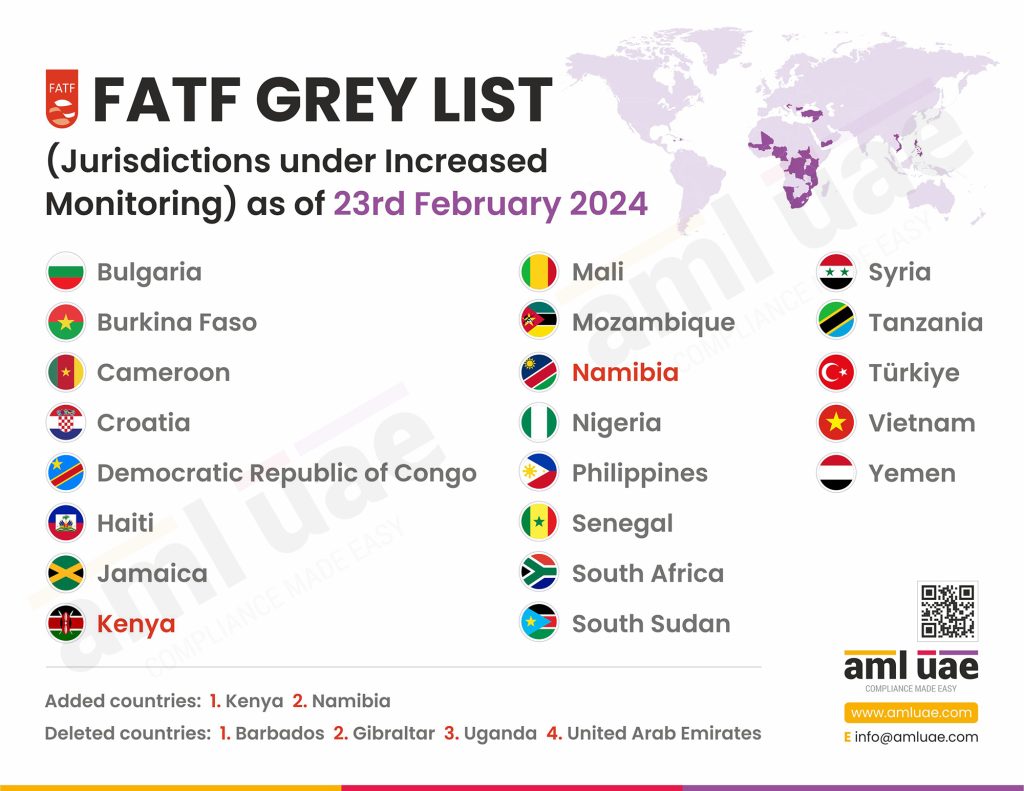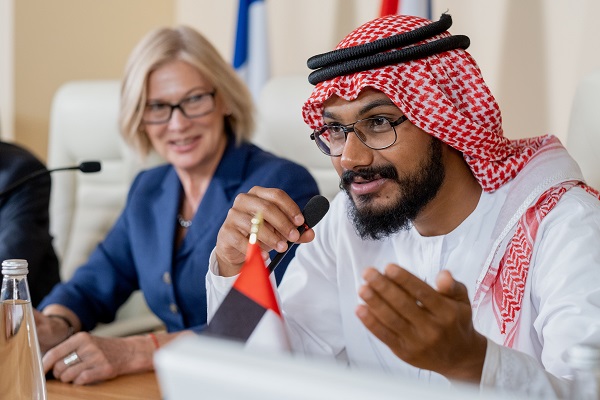FATF List of High Risk Countries
In the latest plenary concluded on 23rd February 2024, The FATF has removed UAE from the Grey List, and similarly, Barbados, Gibraltar, and Uganda have also been removed, whereas Kenya and Namibia have been added to the Grey List.
In October 2023, the Financial Action Task Force (FATF), an international body that establishes intercontinental standards to combat money laundering, counter-terrorism financing and combat financing of proliferation of weapons of mass destruction, updated the list of jurisdictions under increased monitoring. It added Bulgaria to the Grey List, while the following countries were removed:
- Albania
- Cayman Islands
- Jordan
- Panama
The FATF established two statements as part of its listing and monitoring procedures to assure consistency with its international standards:
1. Jurisdictions under Increased Monitoring - Grey List
Which publicly recognizes jurisdictions that have committed to, or are actively working with, the FATF to resolve strategic deficiencies in their anti-money laundering, combatting of terrorism financing as well as combatting of proliferation financing (AML/CFT/CPF) regimes within agreed timelines. This list is commonly known as the “grey list.”
List of Jurisdictions under Increased Monitoring (Grey List) as of 23rd February 2024

| No. | Country | No. | Country |
| 1 | Buglaria | 12 | Senegal |
| 2 | Burkina Faso | 13 | South Africa |
| 3 | Cameroon | 14 | South Sudan |
| 4 | Croatia | 15 | Syria |
| 5 | Democratic Republic of the Congo | 16 | Tanzania |
| 6 | Haiti | 17 | Turkiye (Turkiye) |
| 7 | Jamaica | 18 | Vietnam |
| 8 | Mali | 19 | Yemen |
| 9 | Mozambique | 20 | Kenya |
| 10 | Nigeria | 21 | Namibia |
| 11 | Philippines |
(2) High-Risk Countries Subject to a Call for Action - Blacklist
Which identifies jurisdictions with substantial strategic weaknesses publicly in their AML/CFT/CPF regimes and calls on all FATF members to conduct enhanced due diligence and, in the most severe cases, implement countermeasures to protect the international financial system from money laundering, funding of terrorism and proliferation risks stood by the identified nations. This list is commonly referred to as the “Blacklist.”
Recently, the FATF has added Myanmar to this list of High-Risk countries subject to a Call for Action. Accordingly, with effect from 21st October 2022, the FATF “Blacklist” stands as under

- Iran and the Democratic People’s Republic of Korea (subject to FATF call on its members/jurisdictions to apply countermeasures),
- Myanmar (subject to FATF call on its members/jurisdictions to apply enhanced due diligence measures proportionate to the risks arising from Myanmar).
Save yourself from non-compliance penalties
By hiring AMLUAE for AML/CFT compliance
AML Compliance pertaining to grey-listed and blacklisted countries
All Financial Institutions (FIs) and Designated Non-Finance Businesses and Professions (DNFBPs) are required to have appropriate risk-based AML/CFT protections in place to limit the potential of money laundering and terror financing posed by countries subject to increased monitoring or listed as high-risk jurisdictions subject to a “Call for Action” by FATF.
As a result, FI and DNFBPs must screen customers against the FATF Jurisdictions under Increased Monitoring and High-Risk Jurisdictions Subject to a Call for Action while onboarding and continuously monitor their transactions throughout their business relationship. DNFBPs should ensure that their customer due diligence measures verify their customer’s residence in, or business with, listed countries and that their transaction monitoring measures can examine the size, frequency, and pattern of transactions involving high-risk countries to determine the possibility of occurrence of financial crimes such as money laundering.
FIs and DNFBPs must file suspicious transaction/activity reports (STR/SAR) to the Financial Intelligence Unit (FIU) when red flags are observed so that enforcement actions can be conducted.
Further, FIs and DNFBPs are obligated to report the transaction or activity with high-risk countries subject to a “Call for Action” to the FIU by filing High-Risk Country Transaction Report or High-Risk Country Activity Report (HRC/HRCA), as the case may be
Role of AML UAE
AML UAE is a leading AML compliance services provider in UAE. We help you with fulfilling all the requirements for AML and CFT in UAE. Our spectrum of AML compliance services is not restricted to national boundaries, but we also make sure that you comply with the global regulations of AML.
- Creating firm-specific AML policies, procedures, internal controls, best practices, and guidelines for your smooth business operations
- Setting up an expert AML compliance department for your firm that can handle all AML-related activities
- Selecting the most effective and appropriate AML software for your business needs to ensure AML compliance
- Helping you in filing and submitting annual AML/CFT risk assessment reports with the UAE government
- Conducting training for your employees in handling KYC, screening, risk profiling, CDD, EDD, and filing of STRs
Our recent blogs
side bar form
High-Risk Countries - FAQs
Here are a few frequently asked questions about high risk countries.
When a regime is put on the Grey List by the FATF, it means the country is actively working with FATF to fight against money laundering and other risks. It means the government is taking active measures to identify the deficiencies in its regulatory structure and correct them within the agreed timelines.
FATF Blacklist features the high-risk jurisdictions subject to a Call for Action. As per the FATF October 2022 plenary report, the Democratic People’s Republic of Korea, Myanmar and Iran feature in the FATF Blacklist.
A member of the FATF may impose economic sanctions on a country on the blacklist. North Korea, Iran and Myanmar for example, are both on the FATF Blacklist. As a result, sanctions against North Korea, Iran and Myanmar are possible.
Add a comment
Share via :
About the Author
Pathik Shah
FCA, CAMS, CISA, CS, DISA (ICAI), FAFP (ICAI)
Pathik is a Chartered Accountant with more than 25 years of experience in compliance management, Anti-Money Laundering, tax consultancy, risk management, accounting, system audits, IT consultancy, and digital marketing.
He has extensive knowledge of local and international Anti-Money Laundering rules and regulations. He helps companies with end-to-end AML compliance services, from understanding the AML business-specific risk to implementing the robust AML Compliance framework.





